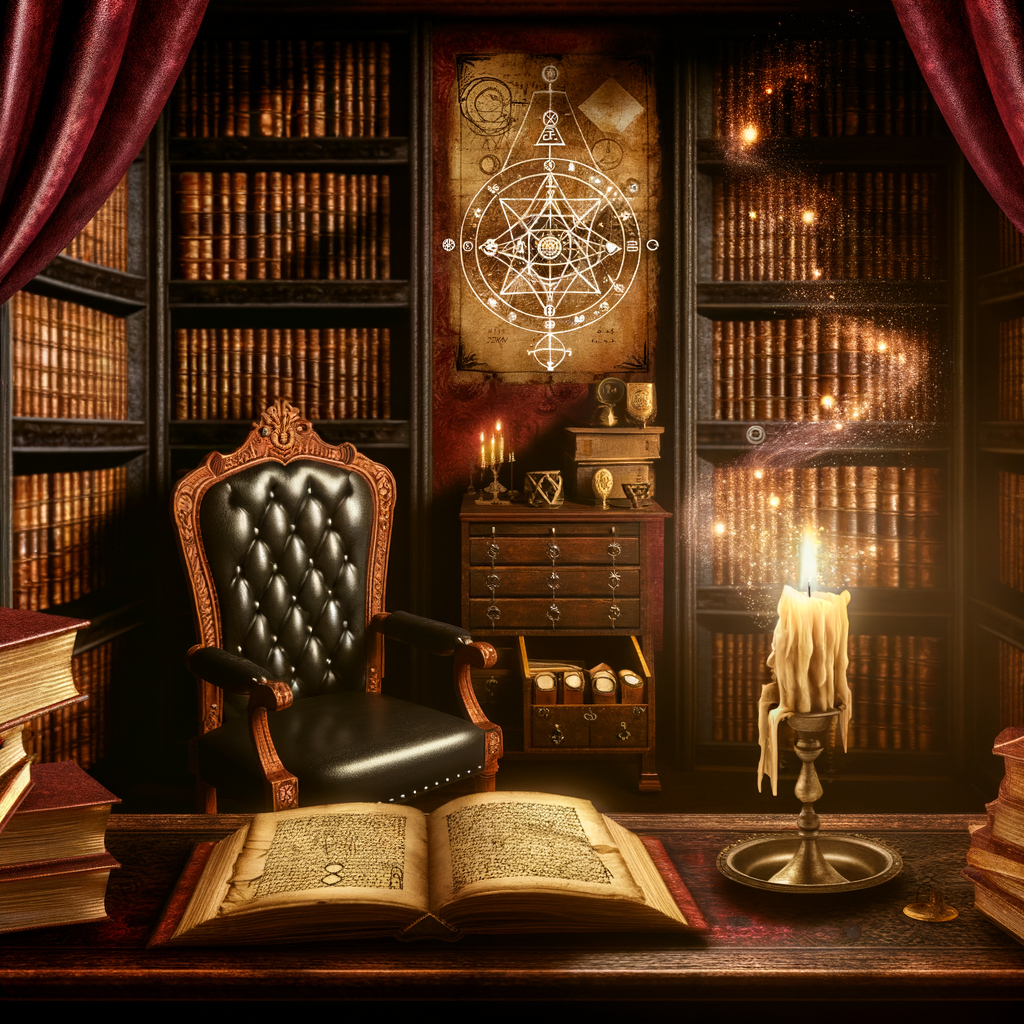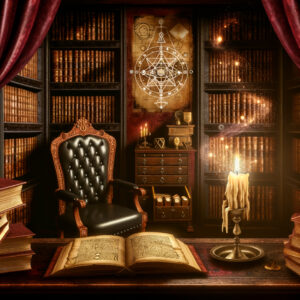Hermeticism, shrouded in an aura of mystery and esoteric knowledge, has fascinated philosophers, mystics and seekers of spiritual truth for millennia. Its roots go back to ancient Egypt, where the concept of the universe as a harmonious whole, permeated with divine energy, was born. Let's dive into the fascinating world of Hermeticism to discover its origins, main tenets and influence on modern culture.
Egyptian Roots of Hermeticism

Hermeticism, known as the pearl of ancient wisdom, originated in Egypt, where the god of wisdom Tehuti, known to the Greeks as Thoth and to the Romans as Mercury, was worshipped. It was Tehuti, often depicted with the ankh - the symbol of life - who imparted Hermetic knowledge to mankind. The influence of Hermeticism is evident in the philosophy of Plato, who probably drew inspiration from Egyptian cosmology. Plato, like the Hermeticists, emphasized the importance of self-improvement and the pursuit of knowledge, which he considered the key to "memory" of the true nature of reality.
Hermeticism took over from Egyptian tradition the symbolism of the triad, or trinity. Cosmic families are formed from multiples of three, based on polarized pairs, which, combining, form a third, unique being. According to Hermeticists, there is also a seven-part structure on all planes of existence. Thus, there are seven states of cosmic being through which universal consciousness is expressed. The Hermetic scale thus contains the key to understanding all organic life.
Hermes Trismegistos and the Emerald Tablets
Hermes Trismegistos, or "Hermes the Thrice Great," is considered the first earthly teacher of Hermeticism. His most famous work is the Emerald Tables, which contain the essence of Hermetic wisdom. Hermes is also credited with the authorship of many other texts, covering a wide range of fields such as medicine, chemistry, law and art, astrology, music, rhetoric, magic, philosophy, geography, mathematics, anatomy. He is considered a teacher of Abraham, and his teachings had a profound influence on the Bible and Kabbalah.
Francis Barrett in his work "Biographia Antigua" writes about Hermes: "If God ever appeared as a man, it was in the form of Hermes. His books on Pymander, treating of creation and divine knowledge of the future, make this clear. Hermes proves in them that he is not only inspired by God, but also a great philosopher who receives wisdom from Him."
Hermeticism and Christianity
Hermeticism's influence extends to other religious and spiritual systems as well. Hermeticism and Christianity are united by the belief in the existence of seven basic principles of truth: mentalism, appropriateness, vibration, polarity, rhythm, cause and effect, and two genders. These universal principles are the foundation of the Hermetic world view and are reflected in many spiritual traditions.
Although Hermeticism and Christianity are separate systems, one can see some parallels between them. The concept of the Logos, the divine word or thought that created the world, resembles the Hermetic idea of a primordial Mind. In both systems there is also a belief in the divine spark in man and the possibility of union with God through self-improvement and the search for knowledge. Hermeticism influenced the development of Christian mysticism and theology, and traces of it can be found in the writings of the Church Fathers and medieval alchemists. However, it should be remembered that Christianity, based on revelation and faith in Jesus Christ, differs from Hermeticism, which emphasizes gnosis, or direct knowledge of God through intuition and mystical experience.
Hermeticism in the Modern World
Hermeticism is still present in our culture. The caduceus, the symbol of Hermes, is used as a logo for the pharmaceutical industry, referring to Hermes' role as the creator of alchemy (chemistry). Hermes also introduced esoteric doctrine and astrology (astronomy) into human knowledge.
The influence of Hermeticism can also be seen in many other areas of life. In Jungian psychology, the archetype of Hermes represents the mediating function between consciousness and the unconscious. In art and literature, Hermetic motifs appear in the works of such artists as William Blake, C.G. Jung and Paulo Coelho. Hermeticism also inspires modern spiritual and esoteric movements, such as the New Age and Christian Hermeticism. Nowadays, when many people are looking for alternative paths to spiritual development, Hermeticism offers a rich tradition and a proven system of practices to help self-improvement and achieve harmony with the universe. However, it is worth remembering that Hermeticism is a path that requires discipline, independent thinking and a critical approach to knowledge.
Elohim and the Seven Centers of Energy
Hermes Trismegistos is seen as the divine physician and messenger of the gods, whom the Hebrews call Elohim. Elohim is the word translated as "God" in the first chapter of Genesis, but should be translated as "gods" because the Hebrew word elohim is plural. Elohim is not Only or Supreme God, but "builders" corresponding to Dhyan Chohan of the secret teachings.
God has seven creative powers, expressed, among other things, in the seven colors of the rainbow. Elohim - gods - can be seen as "thrones" for the One God, the One Being - the very light of life. Elohim are the creative force of the One God, symbolically represented on the "tree of life" as the seven Sephiroth in Kabbalah. These Sephiroth are identical to the seven chakras in the human body, which connect a person's inner nature (thoughts, feelings and soul) to the outer physical form. Chakras maintain a physical tool and act as a direct link to higher intelligence.
Alchemy and Transmutation
According to Hermetic teachings, everything moves, everything vibrates, and healing is about positively changing vibrations. Hermetic alchemy is the art and science of transforming one's personality through knowledge, as well as uniting with God through science. It can be said that alchemy is the science of magic.
Man is a living consciousness sustained by spirit. Every human being is a microcosm in the macrocosm, and is therefore a god or goddess, possessing all the powers of consciousness found in cosmic consciousness.
True Hermetic transmutation is a mental art. Healing is the art of positive transformation of the mind, the integration of mind and body with spirit. True healing is the realization of oneness with God, with the original will, intention and unlimited creative intelligence of the universe.
Hermeticism is an ancient philosophy that offers a holistic view of the world and man. Its main tenets are the unity of the universe, the divine nature of man, the importance of knowledge and self-improvement, and the possibility of transformation through alchemy and energy work. Hermeticism has had a significant impact on the development of philosophy, religion and science, and its ideas continue to inspire people seeking a deeper understanding of reality.


